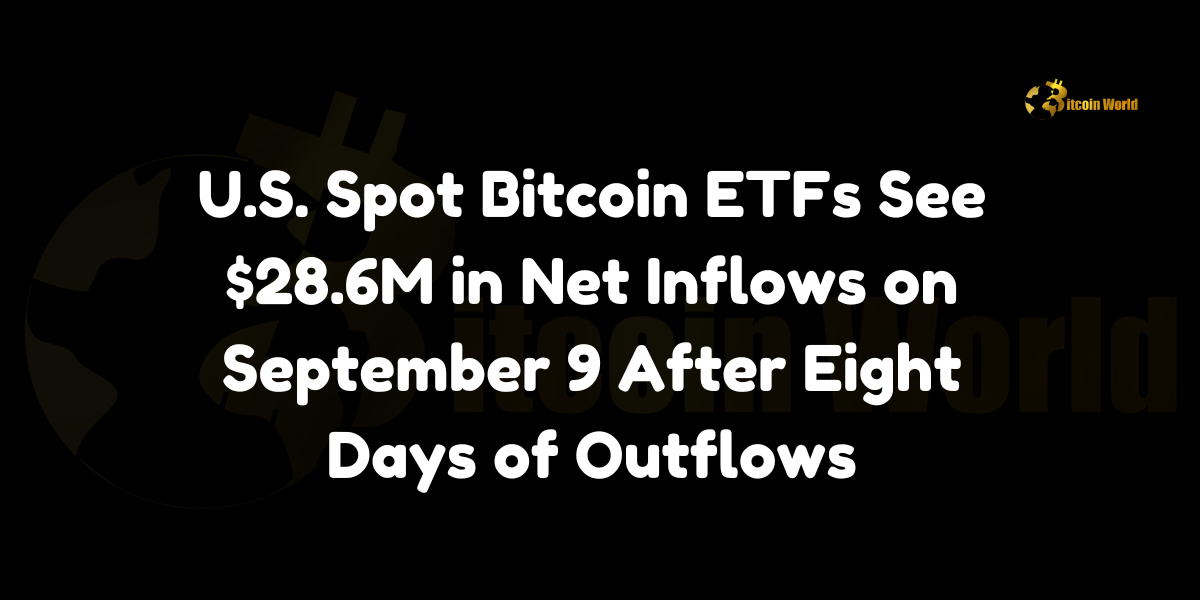US spot Bitcoin ETFs experienced a significant shift on September 9, with total net inflows amounting to $28.6 million, marking the end of eight consecutive trading days of net outflows, according to data from Farside Investors. The surge in inflows was primarily driven by Fidelity’s FBTC, which recorded the largest single net inflow of $28.6 million. Other Bitcoin ETFs, including Bitwise’s BITB, ARK Invest’s ARKB, and Invesco & Galaxy’s BTCO, also saw inflows on the day.
The renewed inflows into spot Bitcoin ETFs suggest growing investor confidence after a period of outflows, likely driven by fluctuations in Bitcoin’s price and market sentiment. However, while several ETFs experienced net inflows, other prominent funds, including Grayscale’s GBTC and BlackRock’s IBIT, continued to see net outflows, totaling $22.8 million and $9.1 million, respectively.
The Leading ETFs Driving Inflows
Among the various spot Bitcoin ETFs, Fidelity’s FBTC led the pack with a $28.6 million net inflow on September 9. This marks a significant recovery for the ETF, which had previously seen outflows amid broader market volatility. Fidelity’s strong performance in terms of inflows reflects investor confidence in its spot Bitcoin offering, which has established itself as one of the most popular Bitcoin ETFs on the market.
Following Fidelity, Bitwise’s BITB recorded a net inflow of $22 million, indicating continued interest from institutional and retail investors in gaining exposure to Bitcoin through regulated investment products. ARK Invest’s ARKB saw an inflow of $6.8 million, while Invesco & Galaxy’s BTCO experienced a more modest inflow of $3.1 million.
Net Outflows for Grayscale and BlackRock ETFs
While several spot Bitcoin ETFs saw inflows, both Grayscale’s GBTC and BlackRock’s IBIT reported notable net outflows. Grayscale’s GBTC recorded a net outflow of $22.8 million, continuing its recent trend of investor withdrawals. This is significant given Grayscale’s previous dominance in the Bitcoin investment space, though its structure differs from a spot Bitcoin ETF as it operates as a closed-end trust.
BlackRock’s IBIT, one of the most closely watched ETFs due to the firm’s influence in traditional financial markets, also saw net outflows of $9.1 million on September 9. Despite this outflow, BlackRock’s foray into the Bitcoin ETF space remains a critical development for the wider cryptocurrency market.
The Significance of Renewed Inflows
The inflow of $28.6 million into U.S. spot Bitcoin ETFs is a positive sign for the broader cryptocurrency market, particularly after eight days of consecutive outflows. These inflows suggest a possible shift in investor sentiment, with more capital flowing back into Bitcoin through regulated investment products. Spot Bitcoin ETFs allow investors to gain exposure to the cryptocurrency without directly holding the asset, providing a safer and more convenient way to participate in the market.
The strong performance of Fidelity’s FBTC on September 9 reflects its appeal among both institutional and retail investors. Fidelity’s Bitcoin ETF is known for its robust infrastructure and regulatory compliance, making it an attractive choice for those looking to gain exposure to Bitcoin in a more traditional investment format.
The positive momentum seen in Bitwise’s BITB and ARK Invest’s ARKB further supports the idea that investors are gradually regaining confidence in the Bitcoin market after a period of volatility. The increased interest in these ETFs may also be a reflection of broader macroeconomic conditions, such as inflation concerns and investor appetite for alternative assets.
What’s Driving the Flows?
Several factors could be contributing to the renewed inflows into U.S. spot Bitcoin ETFs. Bitcoin’s price has seen increased volatility in recent weeks, which often attracts both institutional and retail investors looking to capitalize on price movements. Additionally, broader economic uncertainty, particularly concerns over inflation and the potential for further interest rate hikes, may be driving investors toward alternative assets like Bitcoin.
The launch of additional regulated investment products, such as Bitcoin ETFs, has made it easier for investors to gain exposure to the cryptocurrency market. This accessibility, combined with the security and regulatory oversight of ETFs, has likely contributed to the inflows seen on September 9.
While net outflows from Grayscale’s GBTC and BlackRock’s IBIT suggest that some investors are reallocating their capital or taking profits, the inflows into other ETFs indicate a more nuanced investor sentiment. Different Bitcoin investment products serve various purposes, and the performance of these funds can fluctuate based on market conditions and investor preferences.
The Future of Bitcoin ETFs
The performance of U.S. spot Bitcoin ETFs on September 9 signals a potential turning point in the market, as investors appear to be returning to Bitcoin-related investment products after a period of net outflows. While it remains to be seen whether this trend will continue, the renewed interest in these ETFs suggests that Bitcoin is maintaining its appeal as an alternative investment, particularly in the face of economic uncertainty.
With total inflows reaching $28.6 million and key ETFs such as Fidelity’s FBTC, Bitwise’s BITB, and ARK Invest’s ARKB leading the charge, the market appears to be regaining momentum. However, the continued outflows from Grayscale’s GBTC and BlackRock’s IBIT suggest that investor sentiment is still mixed, and the market may continue to experience fluctuations in the coming weeks.
Conclusion: U.S. Spot Bitcoin ETFs See $28.6M in Net Inflows After a Period of Outflows
U.S. spot Bitcoin ETFs saw a combined net inflow of $28.6 million on September 9, marking a positive shift after eight consecutive trading days of net outflows. Fidelity’s FBTC led the inflows with $28.6 million, followed by Bitwise’s BITB and ARK Invest’s ARKB, while Grayscale’s GBTC and BlackRock’s IBIT experienced continued net outflows. The inflows reflect renewed investor confidence in Bitcoin ETFs, suggesting that despite recent market volatility, interest in Bitcoin remains strong.
To learn more about the innovative startups shaping the future of the crypto industry, explore our article on latest news, where we delve into the most promising ventures and their potential to disrupt traditional industries.





